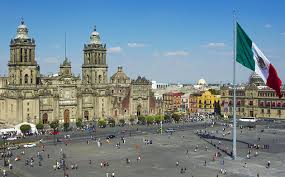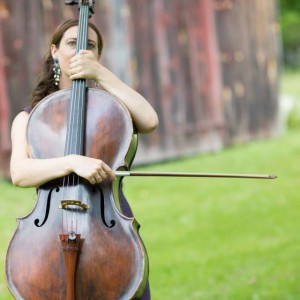 As we each adapt to a new way of living during COVID, music can offer a space beyond words and politics to support us to connect with our innate sense of wholeness while grieving what has been lost. Music acts on all areas of our human being, including the body through vibration, moving to where it is most needed. As such, intentional sound is one of the most gentle yet powerful of medicines. Live music especially can build community connection when physical connection isn’t possible, by holding a space for shared experience.
As we each adapt to a new way of living during COVID, music can offer a space beyond words and politics to support us to connect with our innate sense of wholeness while grieving what has been lost. Music acts on all areas of our human being, including the body through vibration, moving to where it is most needed. As such, intentional sound is one of the most gentle yet powerful of medicines. Live music especially can build community connection when physical connection isn’t possible, by holding a space for shared experience.
Musical Offerings:
1. Garden Concerts
2. Musical Enjoyment (spotify playlists and/or tips for listening )
3. Individual Medicine Pieces
 1. Garden Concerts
1. Garden Concerts
Enjoy the sounds of cello while surrounded by nature. Bring together a small gathering of family and friends or simply for you, within a space that allows for you to honor the guidelines for physical distancing*. The concert will be 45-60 minutes in length and we can select a program together that fits your interest from the repertoire list below. Please note, this is not background music but rather an invitation to listen deeply together.
Discounted COVID times Fee $300 (Barters accepted).
Weather permitting-a rain date is suggested. If cancelled due to weather, I will happily reschedule.
* I will wear a scarf while interacting before and after the concert and remain at 6 feet if law and safety requires, but will remove my face covering when I am performing (being sure to set up at over 10 feet distance) to accommodate the breathing required for athletic musical performance. I can travel anywhere within 200 miles of Holyoke, MA.
I can offer a list of pieces for a potential program, or you may choose from one of my three suggested programs
Sample program:
Monuments and Madness This program explores the movement between sacred geometry of form as well as the wild “in between spaces” of creative “chaos”. Hartka will play works tinged with a variety of influences including Spanish flamenco, celtic music, mayan music and Jazz as well two short compositions by Hartka herself. The concert will conclude with Bach’s magnificent E flat major Suite for solo cello.
Bagpipe Chanter Traditional?
Lord Galways Lament Turlough O Carolan
Keening: Song of Exile Rebecca Hartka
Flamenca from Suite for Solo Cello Rogelio Huguet Y Tagell
Bone Dust Star Dust Rebecca Hartka
Julie-O Mark Summer
Suite 4 in E flat Major JS Bach

2. Musical Enjoyment (playlists and tips for listening via zoom sessions) I can create a playlist to help guide and educate you through a certain area of Western Classical Music. Have you ever been curious about how Mozart Operas reflected the anti-aristocracy, revolutionary tendencies of the late 18th century? Or wondered how Bach’s love for sacred geometry informed his compositions? Do you have a love for French music? We can connect via zoom to give you suggestions on what to listen for in specific works. I can also create playlists via spotify to guide your listening in a particular style or period.
$70/hour (fee dependent on number of sessions and extent of request). (Barters accepted)
3. Individual Medicine Pieces Music is healing in a way that is mysterious, intuitive and global. If you are feeling like you need support to connect with your wholeness, grieve, or simply be inspired, I can create a short solo cello work with you in mind. After speaking together on the phone or zoom, I will improvise and explore sounds until they crystallize into a loosely structured composition that I can share through a digital recording.
Discounted COVID times Fee $200 (Barters accepted).
 My passion has taken me to the threshold spaces between music, culture and healing. While gaining expertise in the Western Art Music Tradition, I have also expanded beyond these boundaries. This impulse can be traced to growing up in rural New York where my Ecuadorian neighbors often had traditional Andean musicians play at our neighborhood bonfire parties while we danced together. My experience of live performance is that it is ceremonial in nature, with the potential to be profound social medicine with participants experiencing their shared humanity through group listening. I am passionate about fostering cross-cultural connection through music, and have, for example, collaborated with Mayan musicians in the Yucatan. At the same time, I believe in the power of Western Classical Music to offer a reflection on culture and history, and I love to perform such composers as Bach, Debussy and Brahms. In college at Oberlin Conservatory I took non-required courses in African American Music History, West African Dance in Diaspora (where we had live drumming for each class), Ethnomusicology and Psychology. My passion for performing inspired me to earn a Masters and Doctorate in Performing Arts at Boston University College of fine arts. I continued to broaden my expression of styles to include Blues, Tango, Brazilian and Celtic music, and improvisation in courses at the Berklee School of Music and at summer festivals such a String Fling. Since 2007, while working to educate young musicians as a professor of music at Montana State University and currently at Keene State College, I ran a concert series, recorded three CDs and performed concerts nationally and internationally. My recent adventures have taken me to Cuba and Mexico, as I develop fluidity in Latin America styles with Cuban American guitarist Jose Lezcano. In 2019 I collaborated with acupuncturist in a group session. For twenty years as an educator with students and listeners I continue to learn how to better facilitate embodiment, empowerment and self-expression through music.
My passion has taken me to the threshold spaces between music, culture and healing. While gaining expertise in the Western Art Music Tradition, I have also expanded beyond these boundaries. This impulse can be traced to growing up in rural New York where my Ecuadorian neighbors often had traditional Andean musicians play at our neighborhood bonfire parties while we danced together. My experience of live performance is that it is ceremonial in nature, with the potential to be profound social medicine with participants experiencing their shared humanity through group listening. I am passionate about fostering cross-cultural connection through music, and have, for example, collaborated with Mayan musicians in the Yucatan. At the same time, I believe in the power of Western Classical Music to offer a reflection on culture and history, and I love to perform such composers as Bach, Debussy and Brahms. In college at Oberlin Conservatory I took non-required courses in African American Music History, West African Dance in Diaspora (where we had live drumming for each class), Ethnomusicology and Psychology. My passion for performing inspired me to earn a Masters and Doctorate in Performing Arts at Boston University College of fine arts. I continued to broaden my expression of styles to include Blues, Tango, Brazilian and Celtic music, and improvisation in courses at the Berklee School of Music and at summer festivals such a String Fling. Since 2007, while working to educate young musicians as a professor of music at Montana State University and currently at Keene State College, I ran a concert series, recorded three CDs and performed concerts nationally and internationally. My recent adventures have taken me to Cuba and Mexico, as I develop fluidity in Latin America styles with Cuban American guitarist Jose Lezcano. In 2019 I collaborated with acupuncturist in a group session. For twenty years as an educator with students and listeners I continue to learn how to better facilitate embodiment, empowerment and self-expression through music.
Full professional bio at www.rebeccahartka.com
Tedx talk here https://www.youtube.com/watch?v=ZHmjLt8_KCY
COVID Cancellations and Reflections on Race
This week I was scheduled to perform a concert at the Historical Piano Concerts with pianist Barbara Lysakowski.
This performance is one of many that have been cancelled due to COVID circumstances. One of the pieces we would have performed is the Frank Bridge Sonata. Consider listening to this recording- the slow movement at 10:15 is especially poignant.
www.youtube.com/watch?v=Gp0wuAhPCbI
Bridge was a pacifist writing this work from 1913-17 and despairing over the futility of war and the state of the world. This work is part of the program we were going to play entitled “Across the Channel” with music written 100 years ago during and after the First World War, and ironically during the time of the last pandemic. English and French composers were defining their unique styles and expression, declaring artistic independence from the long Germanic tradition that dominated western classical music for two hundred years years. They did this by incorporating regional folk tunes into their works, and by expressing their personal experiences. I planned this concert a year ago, well before the current pandemic. What a powerful resonance we might find in this beautiful music at this moment!!
Music forges cultural connection by expressing the broad ethos of a time, as well as the internal world of those able to reflect from a unique vantage point. Music touches in on the timeless and universal. Classical music in particular offers the opportunity for us in the western world to look back on history and grieve the wounds of our culture that seems to so often turn to warfare.

Music making is my whole reason for being, it feeds me because it is where I belong and where I feel joy. I know profoundly the power of art to forge compassion and connection in culture, something badly needed even before the pandemic. Contributing to society in the way that brings me joy is the only truth I can stand inside of. I can’t imagine life without this. Performing has been my constant even inside of a very challenging industry that suffers from extreme lack of support. How painful it is for me to not be able to offer this medicine for people to connect. How oddly cruel to have to process this loss without the one activity that has always helped me process best.
Several times during the past months the grief has overwhelmed any idea of how to move forward. What is different than previous lulls in my schedule is the unknowing as to when and if I will be able to perform in concert halls again because of social distancing. As I witness numerous large musical institutions cancel entire seasons, I wonder how much of this industry will survive the financial losses. As an entrepreneur I am more flexible and resilient than some, but I rely on a community of listeners and the ability for venues to be allowed to open doors. As well, my economic stability has been a chronic challenge.

As I confront these questions, and our country has been intensely focused on racial inequality, I am well aware from my many travels, including to Cuba and Kenya, and in my own city of Holyoke, that I have many privileges. I carry this power with awareness and responsibility. I am also urgently feeling how much compassion and forgiveness is needed at this moment in all directions. I am reminded of my college experience at Oberlin twenty-five years ago, on full need based scholarship, where I struggled to find belonging. My family was declaring bankruptcy at the time, and so I had no safety net. I was experiencing PTSD from a childhood trauma, and my rural background was an invisible cultural difference. I was in a highly competitive male dominated field with peers with more means than I. While I recognized the value in the calls to confront my privilege from students and teachers, in the context of the invisible and unspoken challenges I faced, it felt ironic. And I will admit, it hurt.
Even when I have been in pain, I have continued to do my best to contribute and learn. At Oberlin for example, I spent many hours outside of classes creating a community garden with at risk youth, with my friend Natalie. Our little project attracted the attention of song writer Prince, who then invested a large sum of money in expanding the project. I was motivated not because of an awareness of my privilege (which I really didn’t experience at the time) but from my joy in helping others, my exposure to other cultures and communities, and my love for sustainable agriculture. 
For me anyway, curiosity and connection has always been the best tool for opening my heart to the experiences of others and inspiring the willingness to act and contribute. Nothing could have done this more than my immersive travel (AKA a shoe string budget!) in over fifteen countries. Several courses in African American Music History, Jazz, African Dance in Diaspora, Improvisation and Ethnomusicology began a path of lifetime of learning about the trauma and resilience of the Black experience in America. I remember in one class having an “aha” moment of recognizing how hard it would be to feel any ownership or connection to the larger society if you grew up a person of color in America. I had a further wake up call when I realized this was hardly a revelation to the non whites in the class.
 When I reflect on my life I realize that I have always had the impulse to expand from the narrow education of the conservatory by exploring and teaching improvisation, becoming skilled in a variety of hybridized styles, as well as directing the resources of my sponsors to those in greater need including bringing a cello and supplies to Cuba. Starting from a foundation of love and connection to the music of my ancestors and the comprehensive look at history a doctorate offers, I have a broad view of the development of paradigms, the impact of religion and the voices often on the front lines or sidelines of the Western world. From the inside view of music and composers reflecting on society and sharing their voices, I have an embodied and heartfelt sense for the traumas and brokenness of the western world, as well as the many gifts.
When I reflect on my life I realize that I have always had the impulse to expand from the narrow education of the conservatory by exploring and teaching improvisation, becoming skilled in a variety of hybridized styles, as well as directing the resources of my sponsors to those in greater need including bringing a cello and supplies to Cuba. Starting from a foundation of love and connection to the music of my ancestors and the comprehensive look at history a doctorate offers, I have a broad view of the development of paradigms, the impact of religion and the voices often on the front lines or sidelines of the Western world. From the inside view of music and composers reflecting on society and sharing their voices, I have an embodied and heartfelt sense for the traumas and brokenness of the western world, as well as the many gifts.
What I have noticed from performing across many states in America is a true lack of exposure to classical music. In some liberal circles there is an unspoken sense from folks that my music making represents a form of elitist, conservative, white supremacy. I have had to work hard to not internalize a sense of rejection and distaste for “classical” music, while working to broaden the field to be more inclusive. I have felt inspired to reach for repertoire by underrepresented groups such as women and people of color, to increase the accessibility of concerts, while also educating people about the rich, soulful, and dynamic tradition with many composers at the front of cultural evolution. I have learned that, sadly, many white Americans are ignorant of and disconnected from their roots, and even ashamed of their European ancestors.
It is true that our history is filled with violence, conquest, religious persecution, genocide and I could go on. And it is true that classical music has left out many voices. On a deeper level, I have needed to grieve my ancestral disconnection from body and earth, the extreme shame and self hatred especially for women’s bodies, the violence and betrayal in hierarchical structures, and the resulting hungry ghosts of conquering and addictive consuming. I have done my own embodied release of trauma, and turned towards indigenous wisdom from various authors, as well as experienced ceremony from a variety of indigenous cultures. I have reconnected to the earth centered practices of Europeans, reclaimed belonging and forgiven the harm done by my direct ancestors. Its a continuous process of returning to wholeness,
My personal deeply held belief is that we can find our way forward towards racial equality and planetary healing by offering the skills, assets and power of the modern world in service to indigenous (including European indigenous) wisdom and practices of connection to earth. I believe that how we get there is unique to each of us, and that we each have our role to play. There are many gateways and pathways. My way is an integrated and embodied path towards racial equality with music as my primary tool.
Contributing from a place of joy, financial stability and self care has required some unlearning from the values of our culture (think burning witches, and the whole martyr paradigm of spirituality). Sadly, Western culture has had centuries of persecution towards creatives. Devaluing or even simply missing their contribution. What has that meant for the health and wholeness of our culture and for artists? I have had to confront these questions all of my life, but they have been more front and center now that I feel so voiceless. For example, I have experienced not only lack of support from the culture at large, but financially predatory behavior through all the layers of the industry. For those holding the shadow pieces of a community, the very act of sharing our voices is a contribution to society, an invitation towards more wholeness. Luckily my upbringing gave me lots of grit, and my creative approach to my career as well as the generosity of sponsors has carried me through. I do my best to keep an open heart and to move from love towards self and others, knowing that those who do harm have not even identified the wounds they need to heal. Compassion does not mean I allow the harm, but it means I try to set boundaries through self love rather than hatred for those doing the harm.
While my experiences of trauma and being an artist on the outside of society may provide a place of resonance and connect me with the urgency to make changes in our systems to better support the lives of people of color in America, without addressing the underlying pain of the perpetrators, the solution will be incomplete. Really we can do both, and some folks will be better equipped and more passionate about different areas of contribution. As a musician I am gifted and trained to hold emotional healing space for other European Americans to grieve their profound disconnection from self and earth, with fragmented and broken lineages and loss of homeland and belonging. I am also aware that when I create concerts that intersect cultures with less privilege, I need to do my best to be financially supportive and make space for their voices. For example, when I planned this concert (pictured below) I made sure the mayan musicians were paid, and having acquired a small grant for my travel expenses, I was able to donate my portion of the proceeds towards an educational library that supported the Mexican community.

What would our modern world look like if we made more space for our artists as part of leadership in society (including each of us being guided by our own inner creativity)? What would happen if we were guided by their world-view of creativity, broad embrace of humanity, and interconnectedness? Would we move beyond our need to find an external enemy to blame? Would we begin living from love, rather than fear and survival? Would we remember our deep belonging to each other and to nature?

Music vibrates in all dimensions
And lives in all times
Yet we know her only
In this one moment
We are drawn in by her beauty
Her sacred geometry
Even as she resonates our bodies
To the bone
Reminding each cell
To come home
Her world is beyond words
Of archetypes and myths
She calls forth even the misshapen
And abandoned parts of our humanity
Into her compassionate embrace
Reminding us
We are whole and we belong
After the moment, when she is gone
We learn the timeless nature
Of her ephemeral being
That is deeply felt
But never seen
And remembered long
After the last notes sound.
-Rebecca Hartka 2019

































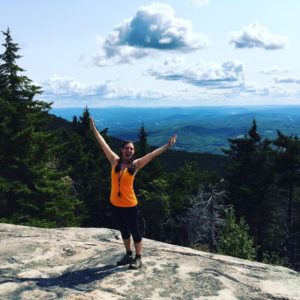









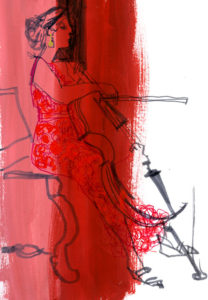
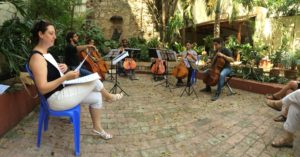




 the profound and colorful vibrancy of humanity also dances and sings on every corner. Having my mom and husband around me, as well as friend and terrific artist Gayle Kabaker, her husband Peter and brother David offered a cultural buffer that was wonderfully soothing amidst wild Havana and helped me take it in within a community setting. I was also pleasantly surprised when my student Charlotte and her partner and partners mom sailed into Cuba to meet up with us! We traveled in our entourage with folks helping with logistics and organization. We shared stories around breakfast from our previous days adventures, and shared a wonderful mutually supportive atmosphere.
the profound and colorful vibrancy of humanity also dances and sings on every corner. Having my mom and husband around me, as well as friend and terrific artist Gayle Kabaker, her husband Peter and brother David offered a cultural buffer that was wonderfully soothing amidst wild Havana and helped me take it in within a community setting. I was also pleasantly surprised when my student Charlotte and her partner and partners mom sailed into Cuba to meet up with us! We traveled in our entourage with folks helping with logistics and organization. We shared stories around breakfast from our previous days adventures, and shared a wonderful mutually supportive atmosphere.

 In one of the old Havana squares with a massive, Spanish colonial cathedral towering over cobbled streets, archways and expansive courtyards we sipped our overpriced, bitter
In one of the old Havana squares with a massive, Spanish colonial cathedral towering over cobbled streets, archways and expansive courtyards we sipped our overpriced, bitter
 sky.
sky.
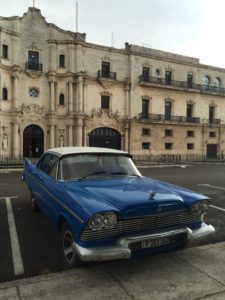







 between acknowledging their talent, but pushing them to grow, supporting them with gifts, but not to the point of being humiliating. I had to consider what conditions I might have attached to my gifts to fellow musicians or what expectations I might set up with these, and work to mitigate any negative effects. I never felt resentment or hatred from any of my a Cuban friends, but instead, a wonderful sense of gratitude and welcoming. Perhaps they sense the possibility of a future as more active members of a global community, and are eager to discover how to get there. My hope is that in the process they hang on to the beautiful spirit of their culture.
between acknowledging their talent, but pushing them to grow, supporting them with gifts, but not to the point of being humiliating. I had to consider what conditions I might have attached to my gifts to fellow musicians or what expectations I might set up with these, and work to mitigate any negative effects. I never felt resentment or hatred from any of my a Cuban friends, but instead, a wonderful sense of gratitude and welcoming. Perhaps they sense the possibility of a future as more active members of a global community, and are eager to discover how to get there. My hope is that in the process they hang on to the beautiful spirit of their culture.
 THANKS I would like to thank so many people, I hope I don’t forget anyone. Jose Lezcano for opening the door to this beautiful world through his music and musical partnership; Alejandro Martinez and wife Mayte for organizing the festival; my husband Wes for his incredible moral and logistical support on the trip; my mom for helping me process my experience, for being a witness to the beauty and tragedy and speaking better Spanish than I when it was crucial; Gayle, Peter and David for enriching the experience with visual reflection and stories; all the amazing student musicians who shared their playing with me; Jasmany, Carina and Iris for the beautiful air bnb experience; the many sponsors who financially supported this adventure with donations large and small; the institute for the musical arts; UNEAC (the Cuban National Union of Writers, Artists, & Composers; Achello; Boston cello Society and Robert Mayes; Johnson String Instrument; anyone else I have neglected to mention
THANKS I would like to thank so many people, I hope I don’t forget anyone. Jose Lezcano for opening the door to this beautiful world through his music and musical partnership; Alejandro Martinez and wife Mayte for organizing the festival; my husband Wes for his incredible moral and logistical support on the trip; my mom for helping me process my experience, for being a witness to the beauty and tragedy and speaking better Spanish than I when it was crucial; Gayle, Peter and David for enriching the experience with visual reflection and stories; all the amazing student musicians who shared their playing with me; Jasmany, Carina and Iris for the beautiful air bnb experience; the many sponsors who financially supported this adventure with donations large and small; the institute for the musical arts; UNEAC (the Cuban National Union of Writers, Artists, & Composers; Achello; Boston cello Society and Robert Mayes; Johnson String Instrument; anyone else I have neglected to mention